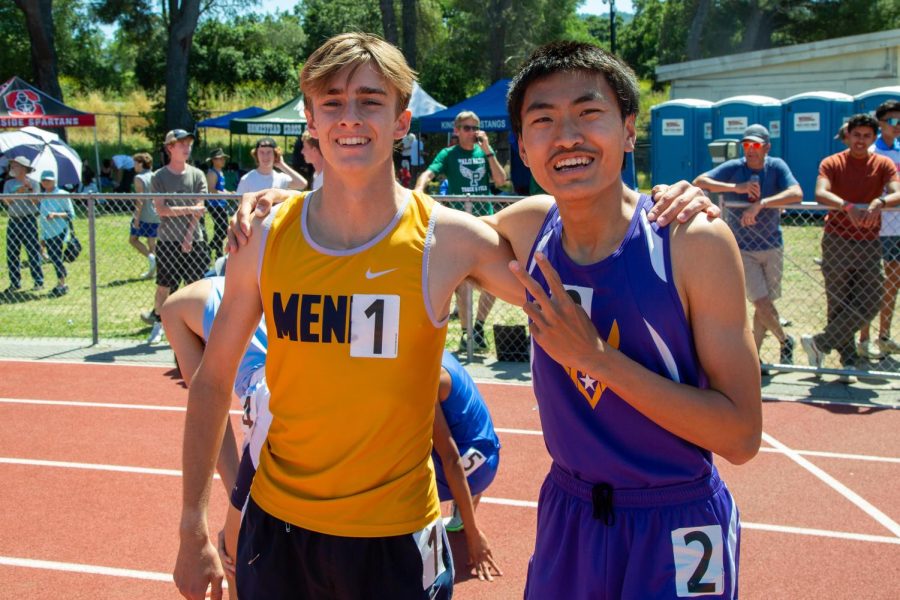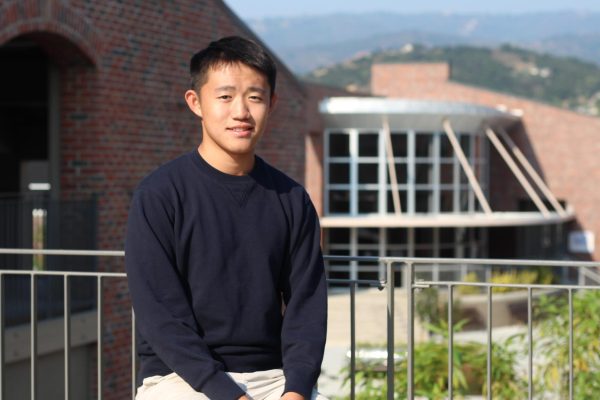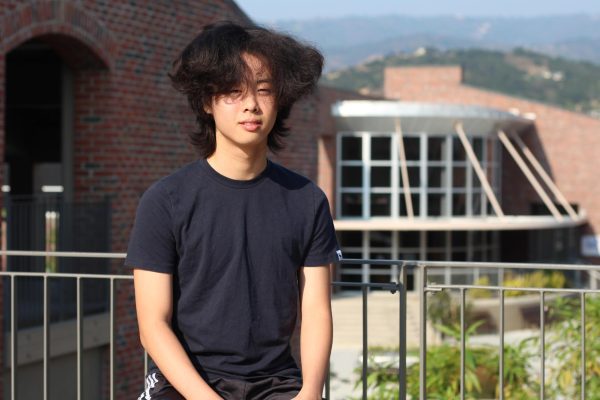Time Out! Ep. 5: Denny Dong
Exploring Denny Dong’s growth as a runner and his future with the team
Denny Dong poses for a photo with Menlo School runner Justin Petre. Petre and Dong placed first and second respectively at the CCS semifinals 800 meter event. Photo courtesy of Denny Dong | Used with permission
June 1, 2023
BX: Hello everyone, my name is Brandon Xu.
AR: And my name is Aidan Ruan. And this is the fifth episode of Time Out!
BX: Each episode, we will be diving into the sports scene here at Monta Vista High School and explore the journeys of athletes from various sports.
AR: Today we will be looking into junior Denny Dong’s journey as a runner in cross country and track and field and how he grew to compete among the best runners in the state.
BX: This episode will explore his experiences with success and failure and what he plans to achieve for the future. Let’s begin.
AR: Let’s begin.
BX: When did you start running for competition?
DD: So in middle school there was this run club that I joined, I found really interesting. So that’s when I first started kind of mildly training, but that wasn’t really heavy training. So most of the training were just from the competitions in middle school.
AR: When did you start taking cross country seriously?
DD: So I just, I feel there’s no point in doing a sport if you’re just doing it for fun. So that’s why.
BX: What events do you run in track of the field?
DD: 400, 800 and if needed, I’ll run the four by four, which is the relay for my team. Four by 100, which is what I’ve been currently doing for the team. And then also SMR, which is sprint, medley relay. I run the 400 for the team.
BX: Why did you choose to join specifically running out of all sports?
DD: Cause I find myself faster than most people when I was a kid.
BX: How do you think your time has improved from before to now?
DD: From the beginning, it’s easier to improve, but then once you get to a certain level there’s certain things you need to do. You have to be really careful, the way you train, how much work you put in, and then more importantly, you have to train correctly. I think after freshman year the improvement started going really high. It’s an exponential curve. But then at the same time there [were] lots of things I needed to deal with, [like] injuries and time management. But in the end, I worked it out and I qualified for States in cross country, but I got hurt afterwards, so I wasn’t able to go to the State meet.
BX: You say that you’ve had challenges with injuries. How would you describe getting over that challenge?
DD: So first you have to be really patient. You can’t just come back too quickly. And then there are certain things you can do to prevent it. You try to get more sleep, you eat more nutritious food and then you have to strengthen different types of muscles that most athletes neglect. These actually help you because you don’t put too much stress on certain parts of the body.
AR: What injuries would you say were the most memorable out of all the years that you’ve done cross country?
DD: You know, lots of injuries are actually connected. So during my sophomore year of track, there was an injury that could have been prevented. I wasn’t really careful where I was stepping, so I actually sprained my ankle. Actually, I was really impatient after that, so I came back really quickly, so that took me a little longer for me to recover, but then afterwards I kind of neglected how important recovery was. I ran a lot of hills, which put a lot of pressure on my Achilles and that actually took me two months out of my cross-country season. So I had to recover through it and I had to work around it, do alternative work to stay in shape. It was really tough making States last season because I wasn’t having a full cross country season.
BX: What other challenges have you faced as a runner?
DD: There are times where the school workout isn’t beneficial so I have to do extra on my own. So I have to go to the gym, I have to swim for better cardio work. I also have to bike a lot, so I make sure I don’t put too much pounding on my body, so it’s multiple variations of works that I’ve done that carry me out through the season.
BX: You’ve mentioned time management. How do you manage your time with running and with all the other aspects of your life?
DD: Taking it seriously does take a lot of time, because even after you run, you have to take at least an hour, half an hour-ish time per day just to recover and strengthen. Sometimes I sleep very late, just to stay up to study some subjects. But then at the same time, if I stay really focused, I do find time to do work.
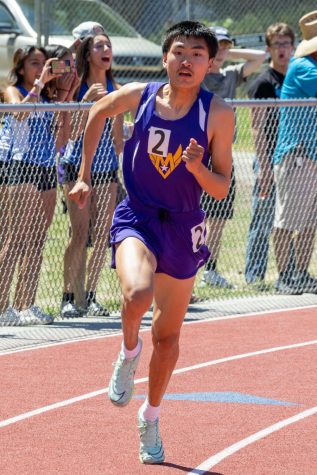
AR: About time, how do you manage it with both school training as well as other types of different training that you do? Since a lot of athletes find difficulty with even school training, how do you find the time to do both school training as well?
DD: Usually during the weekends we have practice in the mornings on Saturdays. So after that, we have the whole day pretty much entirely to [ourselves]. So I either go lifting in the gym or I go swimming, or I might just do a long run on my own. During the weekdays I have a free seventh period so I can actually go to the gym as well during that time.
BX: You talk about how you’ve grown as a runner. What do you attribute your growth to?
DD: Lots of people on the team, different kinds of people, they want, some people really want to do the work and then they have lots of motivation. So the good thing about being in a team is that it’s really hard to do all these workouts, it’s really hard to be committed to this if you’re just on your own. But then with a team that’s very motivated, you tend to push yourself better, and then you think of why you’re doing this sport because first you’re doing it for yourself, and second you’re doing it for the team. So you score points for the team in all the sports you do. It’s how good you wanna be going forward.
BX: What are some memorable experiences you’ve had in cross country?
DD: Since I was injured for roughly two months, I was in no position to even place in the section. But then after I recovered, I had to work extra hard daily. My plan was, I don’t have to necessarily stand out in any invitational races until the end of the season because some people, they actually burn out towards the end so that gives me an opportunity. So throughout Leagues, I placed sixth overall. I knew in CCS finals I knew these are the people I have to beat in order to advance to states, so the night before I really had to focus. I slept early. The next day I tried my best not to be nervous and I just ran the pace I should be running. I followed the guy that’s usually in front of me. In the end I was really, really tired. But then, in my head, I kept telling myself, you have to step it up if you wanna make States. I think this motivation actually helped me. So I was able to push through a large amount of distance and in the end, I passed the two people I was supposed to beat by 0.1 seconds, it was really close. So, I finished sixth in the Section and that was top five individual, and I made States.
BX: How would you describe your speed compared to other runners?
DD: All the runners don’t really have speed. They have to train for it. You can’t expect to have a super, super strong kick, at the end of the race if you just keep doing long runs all the time. If you just keep doing the training that you just run at a pace or you run for a really long time, you just get comfortable running this pace. So in a race you feel, this is much faster than I would run normally. So in your mind you’ll be, ‘Oh I don’t have much of a kick in me.’ Lots of times there’s a mental barrier in your head, speed is something you have to train for, so actually lifting is proportional to speed. It’s how much power you can put to the ground and how [efficiently]nt you’re able to move your body weight. Lifting is really beneficial. Also some people have different talents, some people have incredible stamina, some people were just born with natural speed. But then at the same time, you still have to put in the work or your talent will just be a waste.
BX: How would you describe your experiences with the rest of the Cross Country team?
DD: Some of them are really committed. Some of them, they just want to do it for P.E. credit. Some of them have really rapid improvements. Some people, they show up every day, they’re very committed, but then in their mind, they might not want to put in a 100%effort every day. That could be a reason why they aren’t improving. But then as a team together sometimes it helps you, it motivates you to push, to be better.
AR: Is there an injury that you’re recovering from right now?
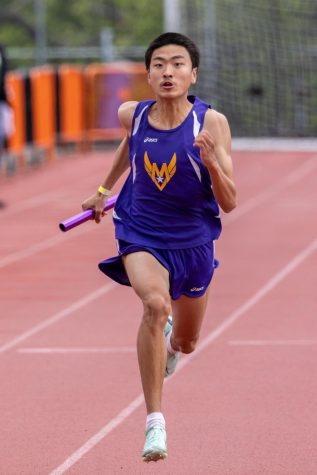
DD: I just recovered from my cross country injuries. Right now I just have some places that are really weak, so that’s why I have to recover really well after doing runs. Right now I don’t have any major issues that I’m dealing with.
BX: Would you say the running is worth the injuries?
DD: To me, yeah.
BX: What benefits has cross country brought you? Or harms?
DD: [A harm] is of course getting injured, and then the benefits are actually I got more fit for track. I met new people and well, that’s the social part. I know how hard I have to work to get to a point.
AR: What tips do you have for people who are recovering from injuries in sports?
DD: Oh, recovering from injuries. Injury is actually part of the training if you think about it, because you really have to be patient about it. If you come back too quickly, if you mess it up, it’s going to take a lot longer than you think to recover. You have to be really careful about it. And also go see a doctor, see what they will say and then don’t act on your own, make sure to do the things that your doctor says, try to recover, sleep well, eat well and then recover well.
BX: Where do you get your injuries seen?
DD: Usually I would go to a clinic. If it’s really bad, I’ll take an MRI, but I have never taken an x-ray before because it wasn’t that serious. Sometimes I go to acupuncture. Those actually help because lots of times injuries are caused due to overuse or tightening up. Acupuncture can actually help you with these.
AR: What are your hopes and goals for the future?
DD: My goals [for] the end of this season is either place in CCS or make States in the 400. My goal time would be anywhere around the 49 range or maybe in the, even the 48s, if the conditions are right. And then for the 800, I’ll try to do the same as well.
BX: Will you continue to run in college?
DD: I’m hoping to get into a D1 college which I still have some ways to go, but then, it’s very possible.
AR: What is your dream D1 college?
DD: I’ll try to get into Stanford or maybe LA or Berkeley, but my times to these UC schools, they’re actually very close. I just need to make a tiny bit of a jump, but then to Stanford, that’s actually a really long way. So if I come to practice with the intent that Stanford is the place where I want to go, that’s how hard I have to work. Even if I don’t get into it, I will see improvement in my times.
BX: What is the time that you’re hoping to achieve?
DD: So this year I hope to achieve in the low 49-ish range, for the 400. It’d be great if I can go sub 49, and then for the 800, I’d hope to go anywhere around 154, 153.
BX: How do you plan to achieve your goals?
DD: I probably have to strengthen a lot. I have to make sure I recover well after workouts. I also have to give out a 100%. We have to also be smart about races, you have to get used to the speed you’re going in. When the race actually matters, your body knows what you need it to do.
BX: That’s it for Episode 5 of Time Out!
AR: Thank you so much to Denny Dong for talking with us. I’m Aidan Ruan.
BX: And I’m Brandon Xu and thanks for tuning in.


